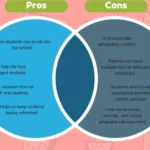As the school year winds down and summer approaches, many teachers may be wondering how they will make ends meet without a regular paycheck. Teaching is a noble profession, but the reality is that many teachers don’t make enough money to cover their expenses during the summer months. Fortunately, there are several ways that teachers can supplement their income and make the most of their summer break. In this article, we’ll explore the various ways that teachers can earn money during the summer, including freelance writing, summer school teaching, online teaching, part-time work, renting out their space, and starting a small business. Whether you’re a seasoned educator or just starting out in the field, there are plenty of opportunities to earn extra money and make the most of your summer break.
Contents
- Do Teachers Get Paid in the Summer?
- What Do Teachers Do Over the Summer?
- How Can Teachers Make Money During the Summer Break?
- Conclusion
-
Frequently Asked Questions
- Are teachers paid during the summer months?
- Do teachers have the option of a 12-month pay structure?
- Can teachers collect unemployment during the summer break?
- Do teachers get paid overtime during the school year or summer?
- What is the average salary of a teacher?
- Do teacher assistants get paid during the summer?
- Are teachers only paid for 190 days?
- Do school staff get paid during the summer?
- Do teachers get paid in summer break?
- How do teachers earn money in the summer?
- References
Do Teachers Get Paid in the Summer?

Teachers play a vital role in society by educating and preparing the next generation for the future. However, teaching is not known for being a lucrative profession, and many people wonder, “Do teachers get paid in the summer?” The answer is, it depends. Some teachers are paid on a 10-month pay structure, which means they receive pay for the nine months of the school year and do not receive pay during the summer. Other teachers are on a 12-month pay structure, which means they receive the same amount of pay spread out over the entire year, including the summer months. If you are a teacher wondering how to make extra money during the summer, there are several options available, including tutoring, sports coaching, freelance writing, and more. Whatever your situation may be, there are ways for teachers to supplement their income during the summer months.
10-Month Pay Structure
10-month pay structure is the most common way that teachers get paid. Under this structure, teachers receive their salaries over 10 months, from September to June, and do not receive payment during the summer months. This means that teachers’ paychecks are larger during the school year, but they do not receive paychecks during the summer months.
In some cases, schools or districts may offer teachers the option to spread their pay over 12 months instead of 10, which is called the 12-month pay structure. This means that teachers receive smaller paychecks during the school year, but they continue to receive paychecks during the summer months.
It is important to note that teachers’ salaries can vary widely based on their experience, education level, and location. According to the National Education Association, the average teacher salary in the United States for the 2020-2021 school year was $65,090.
While some teachers may struggle financially during the summer months due to the lack of a regular paycheck, there are several ways that they can supplement their income. These include freelance writing, summer school teaching, online teaching, part-time work, renting out their space, and starting a small business. Additionally, some teachers may choose to use their summer months for professional development or to prepare for the upcoming school year.
12-Month Pay Structure
Some schools offer a 12-month pay structure to their teachers, which means their salary is spread out over the entire year. This is beneficial for teachers who need a steady income throughout the year. With this pay structure, teachers receive a consistent paycheck each month, including during the summer months when they are not actively teaching.
However, it’s important to note that not all schools offer a 12-month pay structure. Teachers who are on a 10-month pay structure may receive a larger paycheck during the school year, but then they go without pay during the summer months.
For those on a 12-month pay structure, it’s important to budget accordingly and make sure that they are not overspending during the school year, as they will need to rely on those funds during the summer months.
If you’re not on a 12-month pay structure, there are still ways to make money during the summer months. Keep reading to learn more.
What Do Teachers Do Over the Summer?

During the summer, teachers have a lot of free time on their hands, but that doesn’t mean they’re not working. Many teachers use this time to further their education through professional development courses or attending conferences. Others use this time to work on lesson plans and curriculum development for the upcoming school year. Some teachers also take on tutoring or sports coaching jobs to earn extra money. Tutoring is a popular option as it allows teachers to use their skills and knowledge to help others while also earning some extra income. Sports coaching is also a good option for teachers who have a passion for athletics. It allows them to stay active and involved in sports while earning money. There are many options available for teachers to stay busy and earn extra money during the summer months.
Tutoring
is a popular way for teachers to earn extra income during the summer break. Many parents want to ensure that their children are keeping up with their studies during the long vacation, and a qualified teacher can provide the perfect solution. Tutoring can take place in person or online, and there are many websites that facilitate the connection between tutors and students.
One advantage of tutoring is that it allows teachers to focus on their area of expertise. Whether it’s math, science, or English, teachers can use their knowledge and experience to help students who are struggling in a particular subject. Tutoring can also be a great opportunity to work one-on-one with students and provide personalized instruction.
Teachers can advertise their tutoring services through local classified ads, social media, or word of mouth. They can also partner with tutoring companies or online tutoring platforms that connect them with students in need of their services.
In addition to providing an opportunity for extra income, tutoring can also help teachers stay sharp during the summer break. By continuing to work with students, teachers can maintain their teaching skills and stay up to date with the latest trends in education.
Tutoring is a great option for teachers who want to earn extra money during the summer break while also making a difference in the lives of students. If you’re a teacher looking to supplement your income during the summer, tutoring may be the perfect solution for you.
Sports Coaching
During the summer, teachers can consider sports coaching as a way to make extra money. Many schools and community centers offer summer sports programs for young athletes, and they are always in need of experienced coaches. Teachers can leverage their knowledge and expertise to run a successful sports program and earn some extra cash. They can coach a variety of sports such as football, basketball, volleyball, and soccer. Additionally, teachers can advertise their services on social media platforms or community bulletin boards to attract potential clients. This can be a great opportunity to stay active, network with other coaches, and earn some extra income. Teachers can also use this opportunity to develop their coaching skills, which can help them during the regular school year. If you need help with taxes, consider using an H&R Block coupon code or TurboTax discount to save money on tax software.
How Can Teachers Make Money During the Summer Break?
During the summer break, teachers can take advantage of various opportunities to make extra income and utilize their skills. One option is freelance writing, where teachers can use their writing skills and knowledge to create content for websites, blogs, and other publications. Teaching summer school programs, whether in-person or online, is another way to earn money during the summer months. Teachers can also explore online teaching opportunities, such as tutoring or teaching courses through online platforms. Additionally, teachers can take on part-time work such as retail or food service jobs, or even rent out their space on platforms like Airbnb. For those with an entrepreneurial spirit, starting a small business can also be a viable option. With a bit of creativity and resourcefulness, teachers can use their skills and expertise to make the most of their summer break and earn some extra income. For more financial tips, check out the H&R Block coupon code or QuickBooks discounts to help save money on taxes and accounting software.
Freelance Writing
If you have a passion for writing, freelance writing can be a lucrative way to make money during the summer break. Freelance writers are paid to write a range of content, from blog posts and articles to product descriptions and press releases. You can work from the comfort of your own home and set your own hours. Most freelance writing positions pay per word, which can range from as little as $0.01 to as much as $0.10 or more per word. Some websites that pay for freelance writing include Textbroker, Verblio, and BKA Content. Additionally, websites like UpWork and PeoplePerHour allow you to find private clients to work with. Freelance writing is an excellent way for teachers to earn additional income over the summer while utilizing their writing skills.
Summer School Teaching
Summer school teaching is a great way for teachers to earn some extra income during the summer break. Many schools offer summer school programs that require teachers to work for a few weeks or months. This is a great way to earn some extra income while still being able to enjoy some time off during the summer.
Summer school programs vary in length and subject matter. Some programs are designed to help struggling students catch up on their studies, while others are more focused on enrichment and exploring new subject areas. Teachers can choose the program that best fits their interests and expertise.
Summer school teaching can be a great way to supplement a teacher’s income. Generally, summer school teachers are paid hourly or on a per-course basis. The pay rate varies depending on the school district and the subject matter being taught.
To find summer school teaching opportunities, teachers can check with their local school district or search online job boards. Many schools post summer school job openings on their websites or on job search websites.
In addition to earning extra income, summer school teaching can also be a great way for teachers to gain experience and build their resumes. It can also be a way to stay connected with students and colleagues during the summer months.
Pros of Summer School Teaching:
- Supplemental income
- Opportunity to gain experience and build resume
- Stay connected with students and colleagues
Cons of Summer School Teaching:
- Short-term work
- May require additional preparation outside of regular school year
- May interfere with summer plans or vacation time
Internal link: To learn more about whether teachers get paid over summer, check out our article “Do Teachers Get Paid in the Summer?”
Online Teaching
Online teaching is a great way for teachers to earn money in the summer. With the rise of technology, online teaching has become more accessible and popular. Many online teaching platforms allow teachers to create and sell their own courses, and some even offer live teaching sessions. These platforms also provide a wide range of subjects to teach, from academic subjects like math and science to creative subjects like art and music.
One of the benefits of online teaching is that teachers can work from the comfort of their own home. This means that they can save money on transportation and other expenses. Additionally, online teaching provides flexibility in terms of scheduling. Teachers can create their own schedules and work as much or as little as they want.
There are a variety of online teaching platforms available, each with its own requirements and pay rates. Some popular platforms include Udemy, Teachable, and Skillshare. These platforms provide teachers with the tools they need to create and sell their courses, and they also handle the payment processing and marketing.
In addition to creating and selling their own courses, teachers can also work for online tutoring companies. These companies hire teachers to provide one-on-one tutoring sessions to students in a variety of subjects. Some popular online tutoring companies include Tutor.com, Chegg, and Wyzant.
Online teaching is a great way for teachers to earn money in the summer. It provides flexibility, convenience, and the opportunity to share their knowledge and expertise with others. If you’re interested in online teaching, be sure to research the different platforms and opportunities available to find the one that’s right for you.
Part-Time Work
For teachers who want to make extra money during the summer break, finding a part-time job is a great option. Part-time work can be in a variety of different industries, and there are plenty of opportunities available. Some of the most common part-time jobs for teachers include working in retail stores, restaurants, and customer service. These jobs allow teachers to work a few hours a day or on the weekends, and they can earn extra money while still having time to relax and enjoy their summer break.
One great option for part-time work during the summer is to work as a seasonal tax preparer. Tax preparation companies like H&R Block offer seasonal jobs that are perfect for teachers who want to earn extra money during the summer. These jobs typically start in January and end in April, but there are also opportunities to work during the summer months. H&R Block offers a variety of training programs for seasonal tax preparers, so teachers who are looking for a new challenge can learn new skills and gain valuable experience.
Another option for part-time work during the summer is to work as a freelance writer. Freelance writing allows teachers to work from home and set their own schedules, making it a great option for those who want to have more control over their time. Freelance writers can write for a variety of different industries, including education, finance, and travel. Teachers who have experience in these areas can use their knowledge to write informative and engaging articles that can be sold to online publications.
In addition to these options, there are plenty of other part-time jobs available for teachers during the summer. From working in a local bookstore to providing pet-sitting services, there are many different opportunities to earn extra money. Whatever job teachers choose, it’s important to remember that summer break is a time to relax and recharge. By finding a part-time job that is enjoyable and not too demanding, teachers can earn extra money while still having plenty of time to enjoy their summer break.
Rent Your Space
Another way for teachers to earn extra money during the summer is to rent out their space. If you have a spare room, a basement, or even your entire home, you can rent it out to travelers through platforms like Airbnb. This can be a great way to earn some extra cash while you’re away on vacation or visiting family. You can also rent out your space for events like weddings or conferences. Make sure to check local regulations and obtain any necessary permits before renting your space. With a little effort, you can turn your empty space into a lucrative source of income during the summer months.
Start a Small Business
Starting a small business can be a great way for teachers to earn extra income during the summer break. The possibilities are endless when it comes to small businesses, but here are a few ideas to get you started. Teachers can offer tutoring services, teach art classes, or even start a small landscaping or lawn care business. The key is to find something that you enjoy and have a skill set for. Starting a small business does require some initial investment, but with careful planning and budgeting, it can be a profitable venture. Plus, it can provide teachers with the opportunity to be their own boss and have more control over their schedules. Don’t forget to research the legal requirements and regulations for starting a small business in your area.
If you need help with your taxes for your small business, check out these H&R Block coupon codes or H&R Block tax software discounts to save money on tax preparation services or software.
Conclusion
While it is true that many teachers do not receive pay during the summer months, there are still opportunities for teachers to earn money and stay active during their time off. From tutoring and coaching to freelance writing and online teaching, there are a variety of options available to educators who want to supplement their income.
It is important for teachers to plan ahead and explore their options in order to make the most of their summer break. Whether they choose to take on part-time work or start their own business, there are many ways for teachers to stay engaged, earn extra money, and prepare for the upcoming school year.
At the end of the day, teaching is a rewarding and challenging profession that requires dedication and hard work. While it may not always be easy, there are many resources available to help teachers succeed and thrive in their careers.
- Related: If you are looking for ways to save money on your taxes, check out our H&R Block coupon code to get a discount on tax software.
Frequently Asked Questions
Summer break is a great time for teachers to recharge and spend time with their families. However, it can also be a time of financial stress for those who are not on a 12-month pay structure. In this article, we will explore how teachers get paid in the summer and ways they can make extra income during this time.
Are teachers paid during the summer months?
If a teacher is not actively teaching during the summer months, they do not receive a paycheck. However, some teachers opt for a 12-month pay structure, which means their salary is spread out over the entire year.
Do teachers have the option of a 12-month pay structure?
Yes, some schools offer teachers the option to have their salary spread out over 12 months instead of just the 10 months that they work.
Can teachers collect unemployment during the summer break?
It depends on the state and individual circumstances. Teachers who are on a 10-month pay structure and are not working during the summer may be eligible for unemployment benefits.
Do teachers get paid overtime during the school year or summer?
It depends on the school district and state laws. Some states require teachers to be paid overtime if they work more than a certain number of hours per week.
What is the average salary of a teacher?
The average salary of a teacher varies depending on the state and district. According to the National Education Association, the average salary of a public school teacher in the United States was $62,304 for the 2019-2020 school year.
Do teacher assistants get paid during the summer?
Teacher assistants, also known as paraeducators, are typically on a 10-month pay structure and do not receive a paycheck during the summer months if they are not working.
Are teachers only paid for 190 days?
Most teachers are contracted to work 190 days per year, which is the length of the school year. However, they may be required to attend professional development days or work outside of their contracted hours, which are also paid.
Do school staff get paid during the summer?
It depends on the position and the individual’s pay structure. Teachers and staff who are on a 12-month pay structure will receive a paycheck during the summer months.
Do teachers get paid in summer break?
Teachers who are not actively teaching during the summer break do not receive a paycheck. However, some teachers opt for a 12-month pay structure, which means their salary is spread out over the entire year.
How do teachers earn money in the summer?
Teachers can earn money in the summer by taking on part-time work, such as tutoring or coaching, freelance writing, or starting a small business.
Teachers who are not on a 12-month pay structure may experience financial stress during the summer months. However, there are many opportunities for teachers to earn extra income during this time, from tutoring to starting a small business. By taking advantage of these opportunities, teachers can enjoy their summer break without worrying about their finances.







